Edit: See the bottom for some important updates.
Kelsey Piper from Vox's Future Perfect very recently released an interview (made through Twitter DMs) with Sam Bankman-Fried. The interview goes in depth into the events surrounding FTX and Alameda Research.
As we messaged, I was trying to make sense of what, behind the PR and the charitable donations and the lobbying, Bankman-Fried actually believes about what’s right and what’s wrong — and especially the ethics of what he did and the industry he worked in. Looming over our whole conversation was the fact that people who trusted him have lost their savings, and that he’s done incalculable damage to everything he proclaimed only a few weeks ago to care about. The grief and pain he has caused is immense, and I came away from our conversation appalled by much of what he said. But if these mistakes haunted him, he largely didn’t show it.
The interview gives a much-awaited outlet into SBF's thinking, specifically in relation to prior questions in the community regarding whether SBF was practicing some form of naive consequentialism or whether the events surround the crisis largely emerged from incompetence.
During the interview, Kelsey asked explicitly about previous statements by SBF agreeing with the existence of strong moral boundaries to maximizing good. His answers seem to suggest he had intentionally misrepresented his views on the issue (see below for an important notice regarding this question):
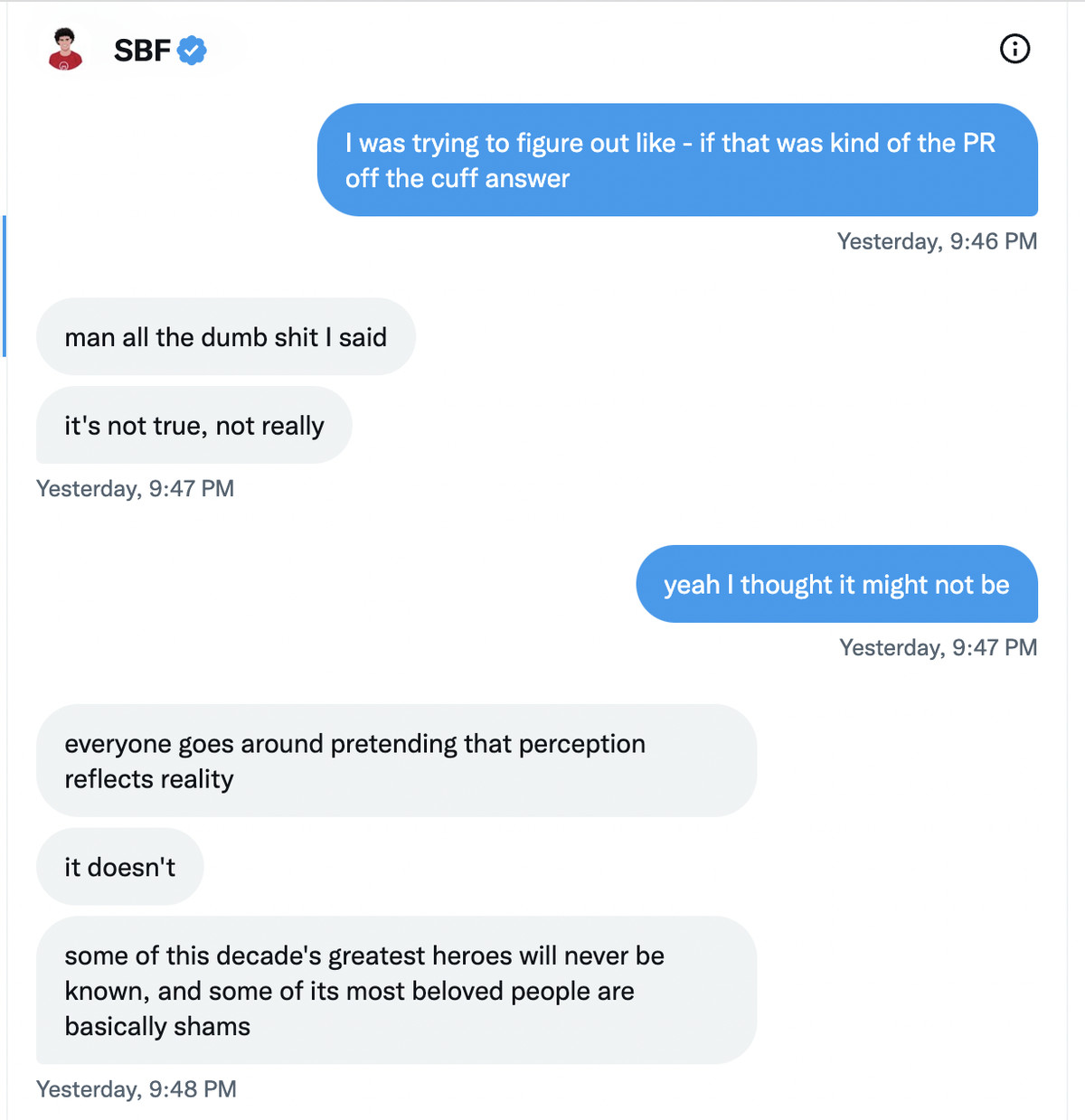
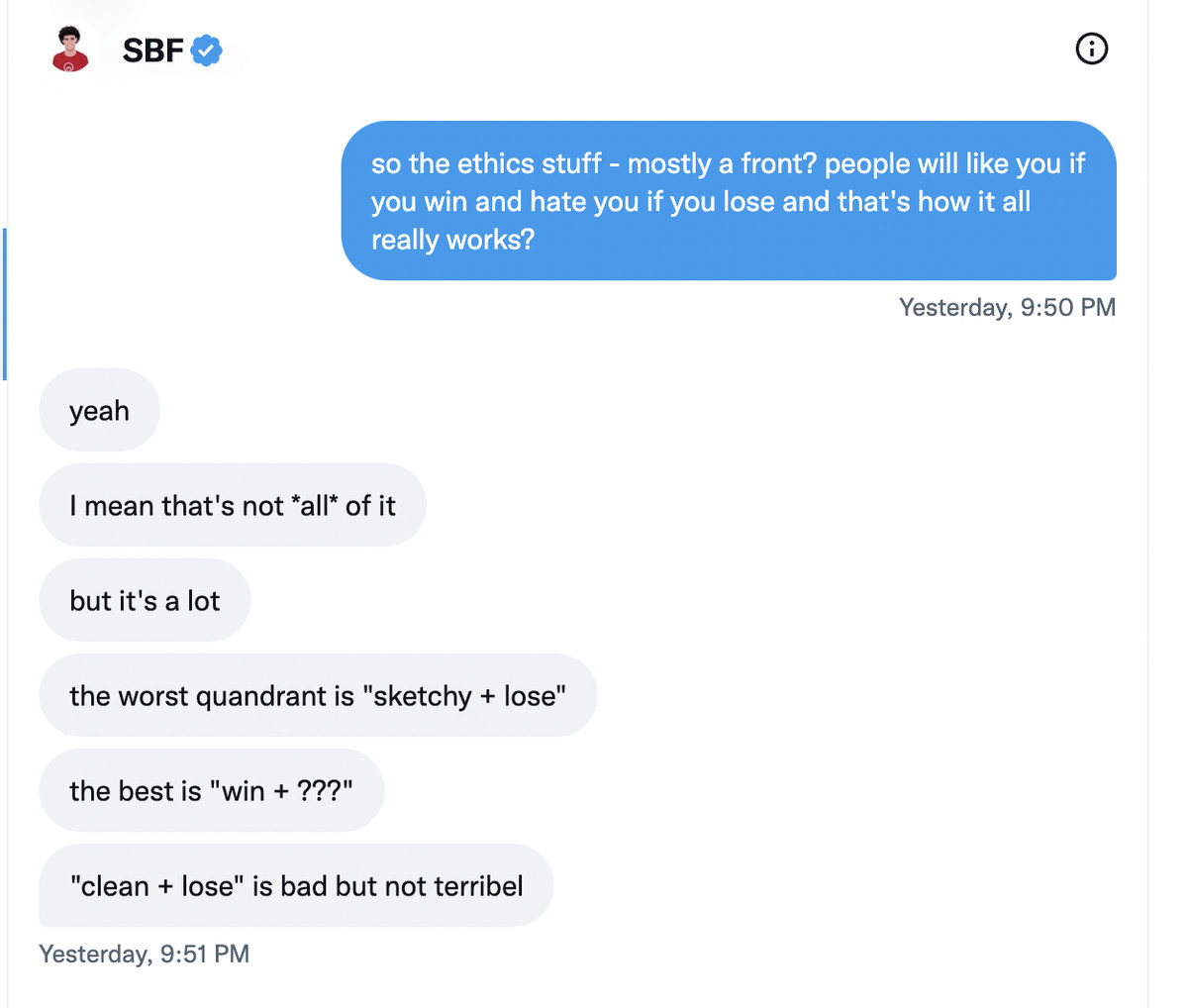
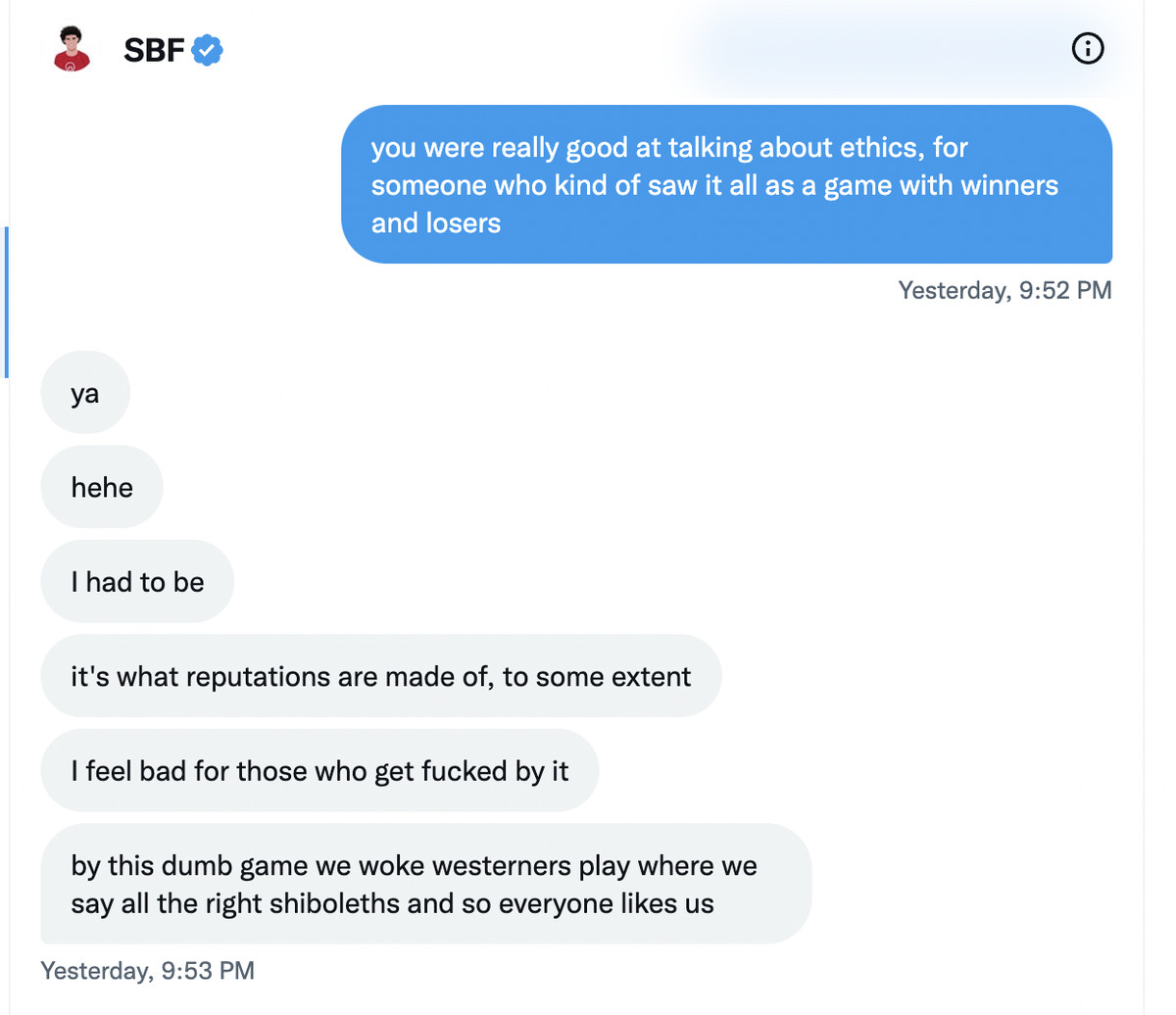
This seems to give some credit to the theory that SBF could have been acting like a naive utilitarian, choosing to engage in morally objectionable behavior to maximize his positive impact, while explicitly misrepresenting his views to others.
However, Kelsey also asked directly regarding the lending out of customer deposits alongside Alameda Research:
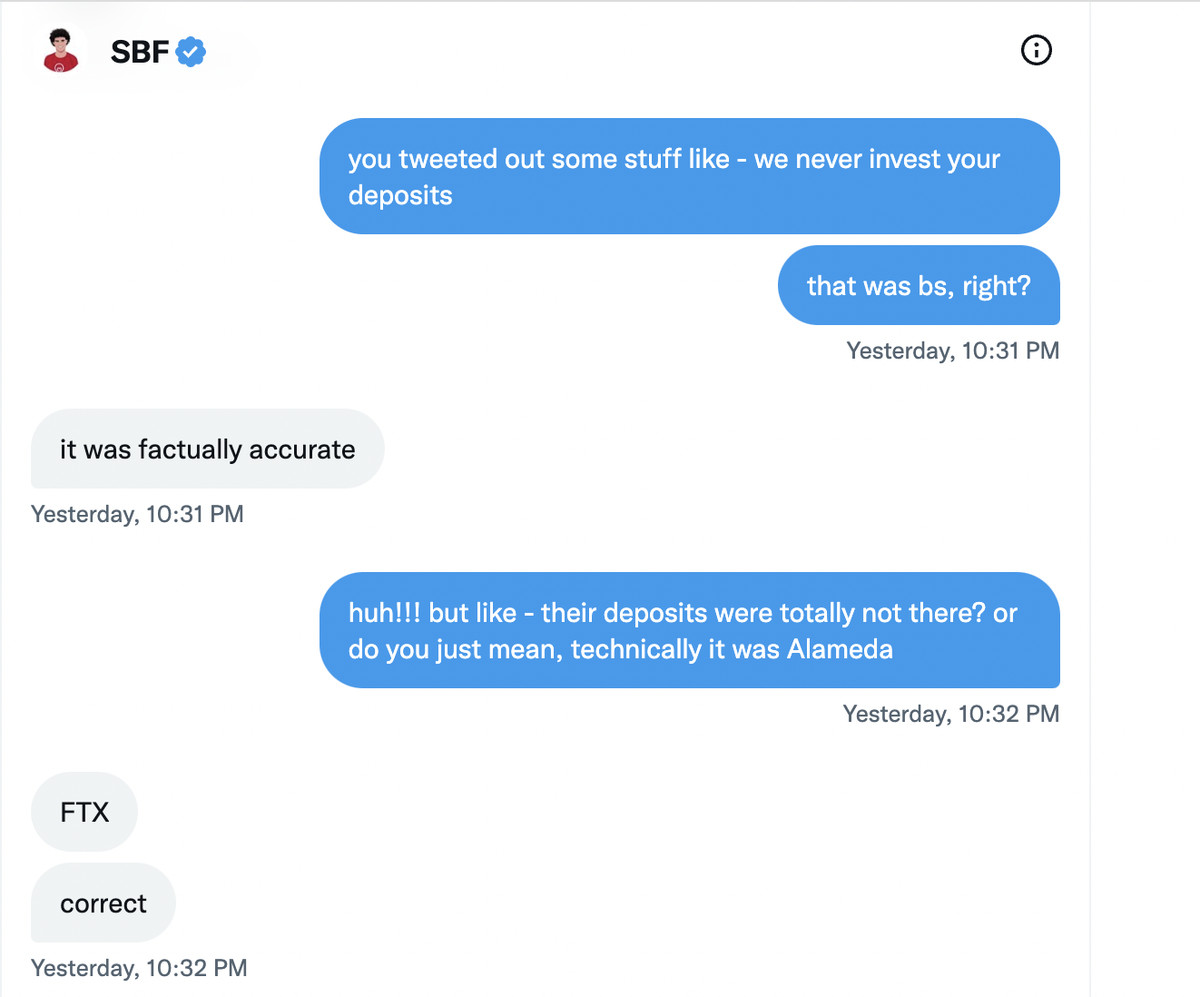
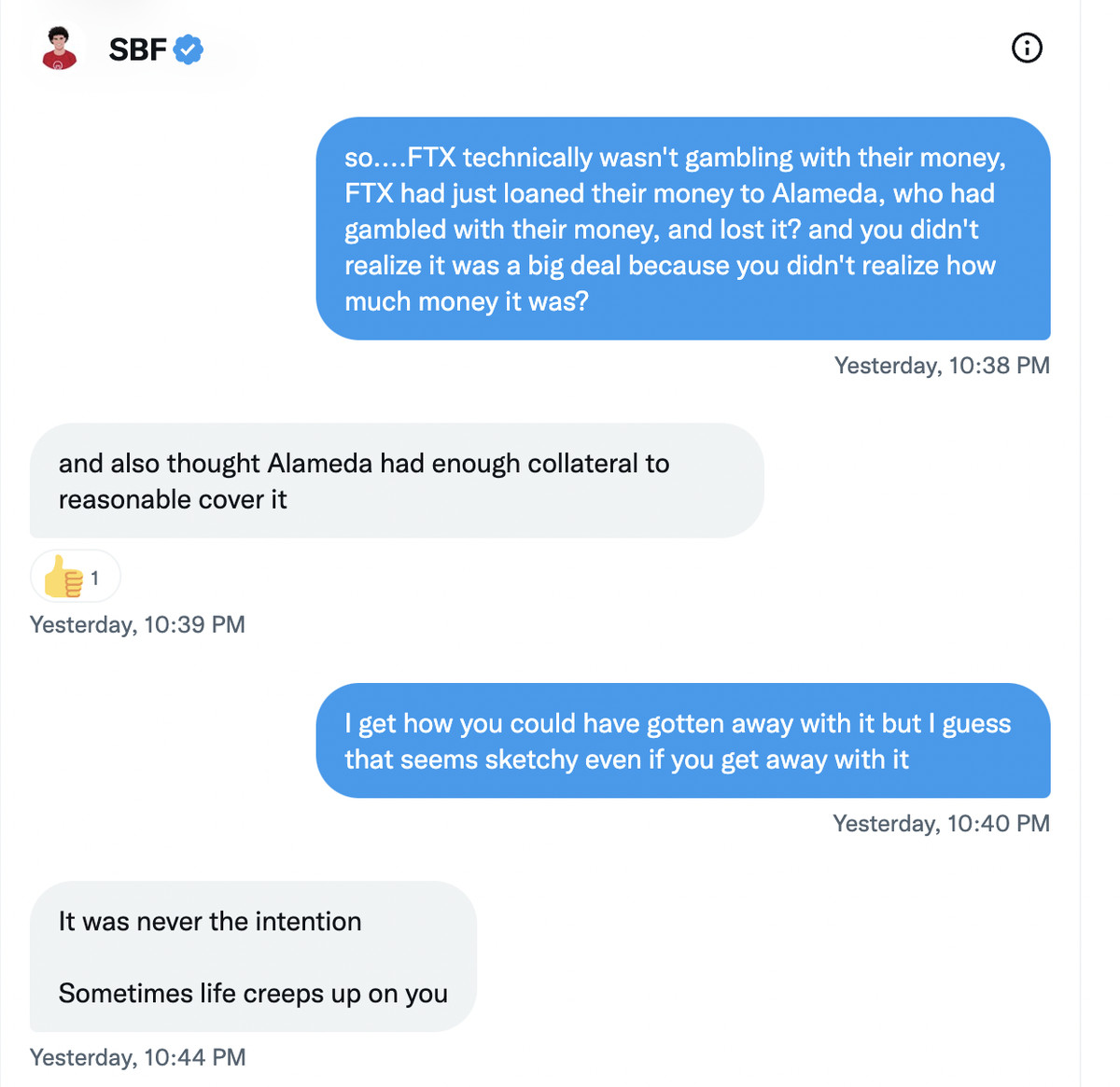
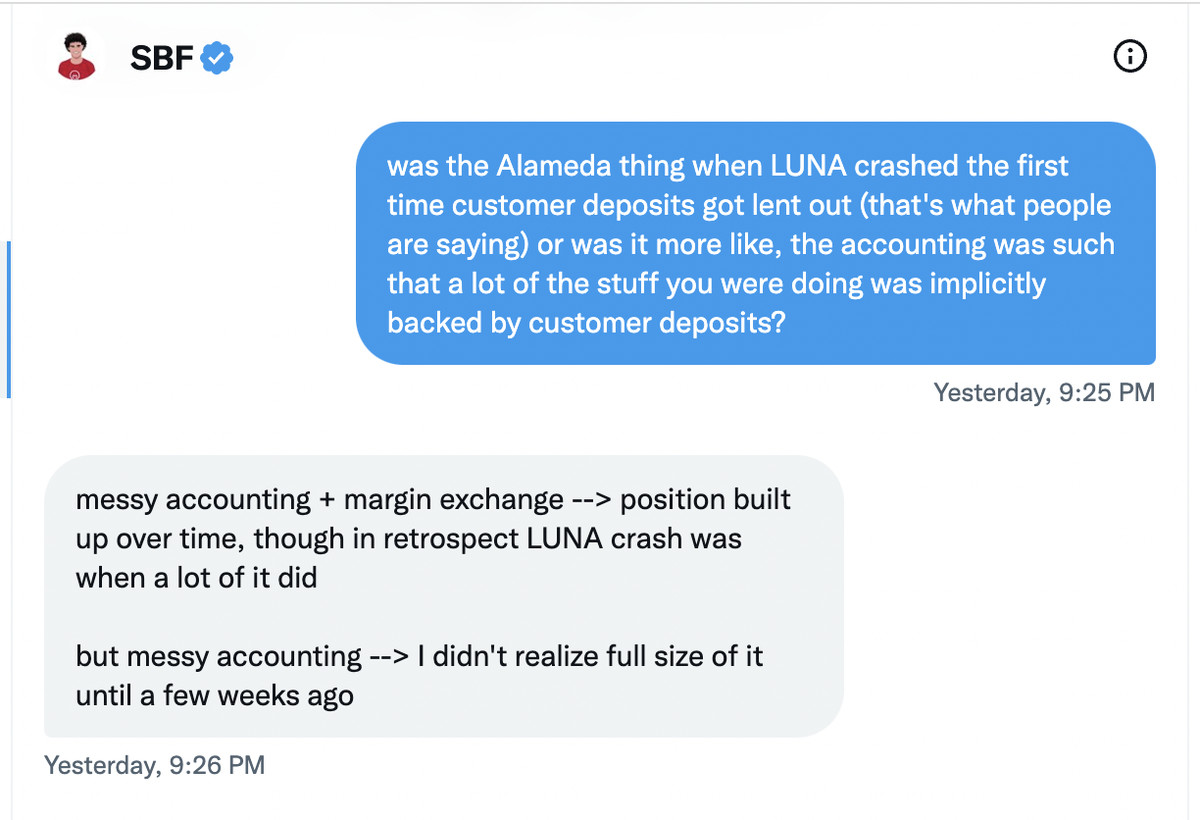
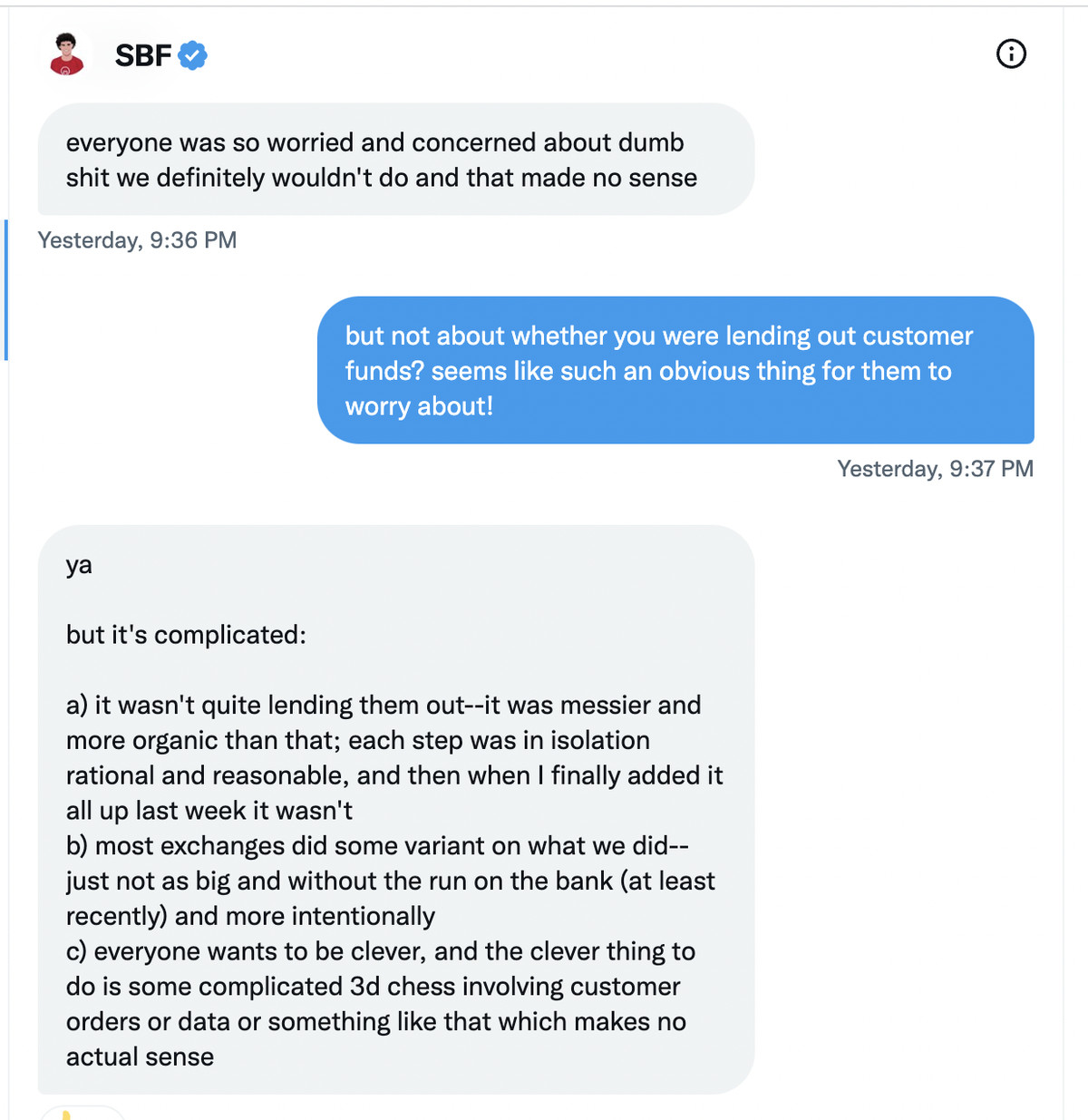
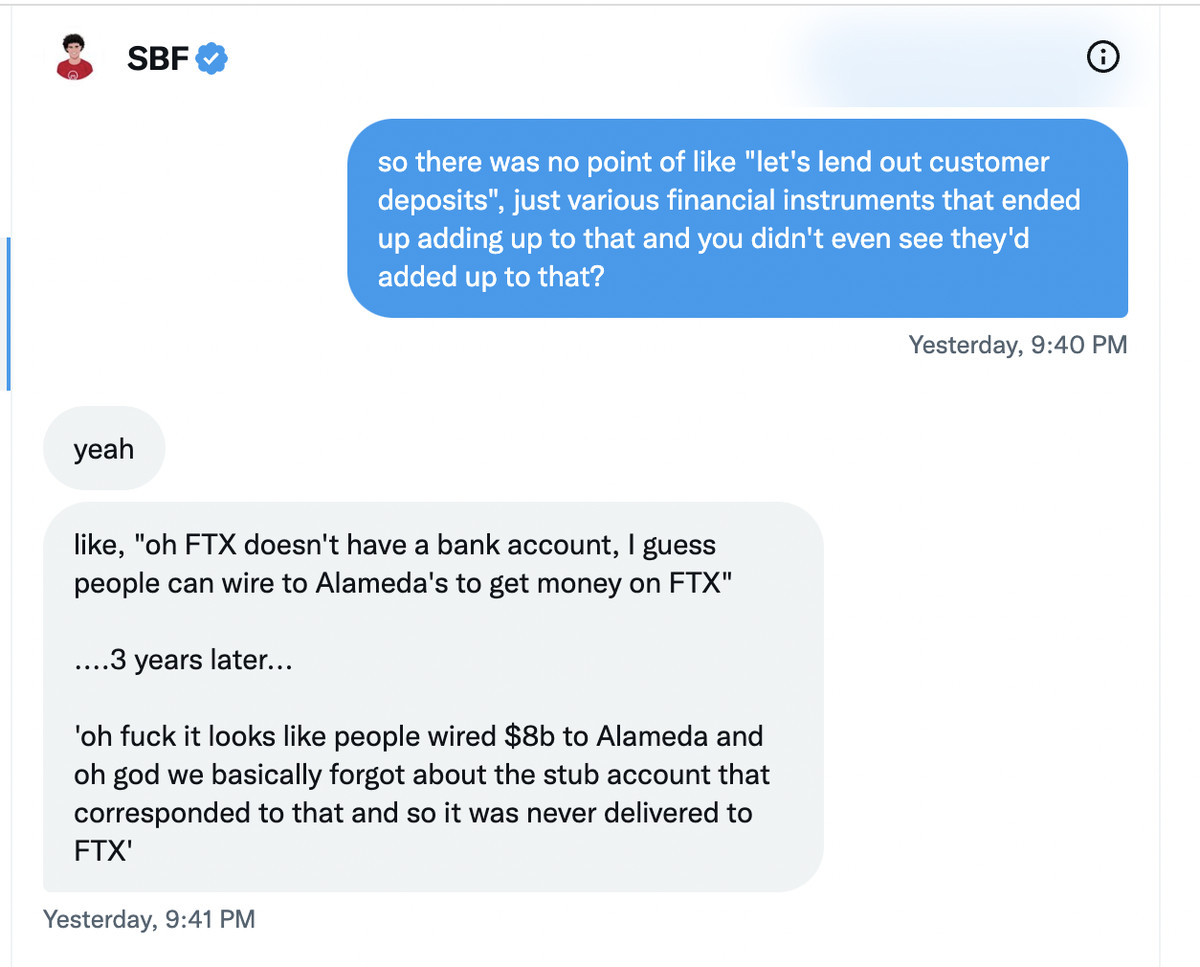
All of his claims are at least consistent with the view of SBF acting like an incompetent investor. FTX and Alameda Research seems to have had serious governance and accounting problems, and SBF seems to have taken several decisions which to him sounded individually reasonable, all based on bad information. He repeatedly doubled down, instead of cutting his losses.
I'm still not sure what to take out of this interview, especially because Sam seems, at best, somewhat incoherent regarding his moral views and previous mistakes. This might have to do with his emotional state at the time of the interview, or even be a sign that he's blatantly lying, but I still think there is a lot of stuff to update from.
Edit: As some in the comments have pointed out, SBF recently said these messages were not intended to be on the record, and Kelsey responded she supposed otherwise. I've decided to keep the screenshots, as they're now part of the public record.
Furthermore, keep in mind there is discussion about how to best interpret the answer to the question “so the ethics stuff—mostly a front?”, since the context to this question is the specific discussion about ethical injunctions. The right interpretation is a crucial consideration to most of the comments below.
Notably, this has been taken in social media to mean SBF admitted to faking his belief in EA more generally, with others suggesting that is the wrong interpretation.

Man, this interview really broke my heart. I think I used to look up to Sam a lot, as a billionaire whose self-attested sole priority was doing as much as possible to help the most marginalized + in need, today and in the future.
But damn... "I had to be good [at talking about ethics]... it's what reputations are made of."
Just unbelievable.
I hope this is a strange, pathological reaction to the immense stress of the past week for him, and not a genuine unfiltered version of the true views he's held all along. It all just makes me quite sad, to be honest.
He's probably desperate and confused now, and both of these affect his messages. I wouldn't trust that he's now giving a "true", unfiltered view into his motives - rather, seeing as he has to be lying somewhere, I assume it's both then and now.
I doubt he consciously knows his own motives in full. None of us do. But what we say, and how we say it, can still inform others about them. And the cynicism, dishonesty and anti-wokeness all seem genuine to me.
This interview is crazy.
One overarching theme is SBF lying about many things in past interviews for PR. Much of what he said in this one also looks like that.
While SBF presents himself here as incompetent rather than malicious and fraudulent, his account here contradicts previous reporting in (at least) two nontrivial ways.
While I agree these contradictions are worth exploring, I don't think (1) directly contradicts the incompetence hypothesis. Seeing the article:
I read this as completely coherent with what SBF said: “each step was in isolation rational and reasonable, and then when I finally added it all up last week it wasn't”.
As for (2), I don't think it's a big update on the fraud hypothesis. A backdoor can mean having admin access to a server, which I think gives a more parsimonious explanation.
It's worth pointing out that if SBF was malicious and fraudulent, this whole interview could have just been an attempt to save faces, which is why we shouldn't update strongly either way. We should wait till more external evidence arrives.
Keeping this arrangement from the rest of Alameda / FTX, including legal and compliance, strongly implies they knew it was fraudulent.
Agree with your point on (2) that it could technically mean admin DB access.
Yeah, you're right. If these were just decisions that seemed individually rational, I don't see why so few of them were aware that these decisions were made. It's definitely suspicious.
From Reuters:
This also sounds more like an explicit backdoor built into a system, but not totally conclusive.
[EDIT: I was assuming from the content of the conversation Sam and Kelsey had some preexisting social connection that made a "talking to a friend" interpretation reasonable. From Kelsey's tweets people linked elsewhere in this thread it sounds like they didn't, and all their recent interactions had been around her writing about him as a journalist. I think that makes the ethics much less conflicted.]
I'm conflicted on the ethics of publishing this conversation. I read this as if Sam's is talking to Kelsey this way because he thought he was talking casually with a friend in her personal capacity. And while the normal journalistic ethics is something like "things are on the record unless we agree otherwise", that's only true for professional conversations, right? Like, if Kelsey were talking with a housemate over dinner and then that ended up in a Vox article I would expect everyone would see that as unfair to the housemate? Surely the place you end up isn't "journalists can't have honest friendships", right? Perhaps Kelsey doesn't think of herself as Sam's friend, but I can't see how Kelsey could have gone through that conversation thinking "Sam thinks he's talking to me as a journalist".
On the other hand, Sam's behavior has been harmful enough that I could see an argument that he doesn't deserve this level of consideration, and falling back on a very technical reading of journalistic ethics is ok?
Copying what I posted in the LW thread:
Sam has since tweeted "25) Last night I talked to a friend of mine. They published my messages. Those were not intended to be public, but I guess they are now."
His claims are hard to believe. Kelsey is very well-known as a journalist in EA circles. She says she interviewed him for a piece in May. Before Sam's tweet, she made a point of saying that she avoids secretly pulling "but I never said it would be off-the-record, you just asked for that" shenanigans. She confirmed the conversation with an email from her work account. She disputes the "friend" claim, and says they've never had any communication in any platform she can find, other than the aforementioned interview.
The only explanations that make sense to me are:
The tweet you linked to appears to have been deleted.
Kelsey's correction.
I'm honestly more than a bit surprised to see there being doubts on the propriety of publishing this. Like on the facts that Kelsey gives, it seems obvious that their relationship is journalist-subject (particularly given how experienced SBF is with the press). But even if you were to assume that they had a more casual social relationship than is being disclosed (which I do not), if you just blew up your company in a (likely) criminal episode that is the most damaging and public event in the history of the social movement you're a part of, and your casual friend the journalist just wants to ask you a series of questions over DM, the idea that you have an expectation of privacy (without your ever trying to clarify that the conversation is private) does not seem very compelling to me.
Like, your therapist/executive coach just gave an interview on the record to the New York Times. You are front page news around the world. You know your statements are newsworthy. Why is the baseline here "oh this is just a conversation between friends?" (Particularly where one of the parties is like "no we are totally not friends")
I don't mean for my tone to be too harsh here, but I think this article is clearly in the public interest and I really just don't see the logic for not publishing it.
Kelsey's messages are written in a style of informality that strongly suggests a casual conversation with a friend, and not a formal interview with a journalist. The emoji reactions have a similar effect, and there isn't an introductory message along the lines of "would you be happy to talk to vox". This overall seemed somewhat manipulative to me.
Ugh, yeah. Publishing details about people without their consent (especially if there's a bait and switch like you suggested) is the kind of thing I'd expect from an outlet like TMZ, not Vox's Future Perfect. I think that, if it seemed like SBF didn't realize the conversation was on the record, Kelsey should have clarified that to him at some point.
Edit, clarification: In the theory of contextual integrity, there are context-relative information norms that dictate when and with whom one can share private information about someone else. Different sets of norms apply to conversations with journalists in their capacity as journalists and casual conversations. Like you said, the tone of the conversation suggests that the casual-conversation norms should apply. If Kelsey wanted to publish the conversation, she should have clarified that she wanted the journalist-conversation norms to apply.
That’s just not how it works, and everyone who interacts with journalists with any regularity at all (like Sam has for years) knows that that’s not how it works.
A lot of people in this thread don’t know those norms and seem to be trying to reason about them from first principles or something. This is not useful. The norms are what they are, have been well-established for decades, and are common knowledge among all relevant parties. Sam has certainly had them explained to him many, many times.
This is entirely on him.
Surely everyone on this thread realises that there should be a relevant distinction between being some random hack and 'the EA journalist'. We're holding her to higher standards than general journalistic norms.
Some thoughts about this --
I genuinely thought SBF spoke to me with the knowledge I was a journalist covering him, knew we were on the record, and knew that an article quoting him was going to happen.*** The reasons I thought that were:
- I knew SBF was very familiar with how journalism works. At the start of our May interview I explained to him how on the record/off the record works, and he was (politely) impatient because he knew it because he does many interviews.
- I knew SBF had given on the record interviews to the New York Times and Washington Post in the last few days, so while it seemed to me like he clearly shouldn't be talking to the press, it also seemed like he clearly was choosing to do so for some reason and not at random. Edited to add: additionally, it appears that immediately after our conversation concluded he called another journalist to talk on the record and say among other things that he'd told his lawyer to "go fuck himself" and that lawyers "don’t know what they’re talking about". I agree it is incredibly bizarre that Sam was knowingly saying things like this on the record to journalists.
- Obviously SBF's communications right now are g... (read more)
edited
I'm going to argue a line here that I'm uncertain of.
The key question in this part of the thread seems to be "Did SBF expect you to be on the record?". To which, I guess you were scared the answer was no, hence you didn't ask during the initial conversation. Even in the follow up you don't say "can I share our screenshots".
I can see the social benefit to the conversation. But I guess I don't necessarily buy the "I did the journalism norms thing so it's okay". I think I buy "it provided a lot of social benefit so I did it" which does feel ends justify means-ey but in a way that I think most people can accept from someone who defrauded billions of dollars.
I don't say you were wrong. Who prepares for a decision like this? It was the break of a lifetime and it would have almost seemed suspicious if you let a funder off here. But I don't necessarily buy that it was straightforwardly acceptable either. What I do think is that I don't buy the "it was journalistic norms" defence.
But her defense wasn't that she was just following journalistic norms, but rather that she was in fact following significantly stricter norms than that.
And why would sharing the screenshots in particular be significant? Writing a news story from an interview would typically include quotes from the interview, and quoting text carries the same information content as a screenshot of it.
For what it's worth, I don't buy this.
My understanding is that you didn't ask SBF whether he wanted the text published. More importantly, I am confident you would have been able to correctly predict that he would say "no" if you did ask. Hence, why you didn't.
The reasons SBF wouldn't want his DMs published are too obvious to belabor: he said things like "fuck regulators", that his "ethics" were nothing but a cover for PR, and he spoke in a conversationalist rather than professional tone. Even if you actually thought he would probably be OK with those messages being leaked, an ethical journalist would at least ask, because of the highly plausible "no" you would have received.
In my opinion, publishing the DMs without his consent might have been the right thing to do, for the greater good. I do not think you're a bad person for doing it. But I don't think it makes sense to have expected SBF to want the conversation to be published, and I don't think it makes sense for you to claim you thought that.
I'm also not persuaded by the appeal journalistic norms, since I think journalistic norms generally fall well below high ethical standards.
I believed that SBF thought not that the conversation was secret but that the coverage would be positive.
My best guess is:
- if you asked SBF "did you know that Kelsey was writing a story for Vox based on your conversation with her, sharing things you said to her in DMs?" the answer would be yes. Again, I sent an email explicitly saying I was writing about this, from my Vox account with a Vox Media Senior Reporter footer, which he responded to.
- if you asked SBF "is Kelsey going to publish specifically the parts of the conversation that are the most embarrassing/look bad", the answer would be no.
- if you asked me "is SBF okay with this being published", I think I would have said "I know he knows I'm writing about it and I'm pretty damn sure he knows how "on the record" works but he's probably going to be mad about the tone and contents".
I agree that it would be bizarre and absurd to believe, and disingenuous to claim, "Sam thought Kelsey would make him look extremely bad, and was okay with this".
This is not the claim I am making. I don't think you thought that, or claimed that.
The most important claim I'm trying to make is that I think it was obvious that SBF would not want those DMs published, and so it doesn't make sense for you to claim you thought he would be OK with it.
Note that I am not saying that publishing those DMs is definitely bad. Again, it might have been worth it to violate his consent for the greater good. I'm still uncertain about the ethics of violating someone's consent like that, but it's a plausible perspective.
I mostly just don't think you should say you thought he'd be OK with you publishing the DMs, because I think that's very likely false.
"I genuinely thought SBF was comfortable with our interview being published and knew that was going to happen. "
This is not credible, and anyone who thinks this is credible is engaged in motivated reasoning.
I still think you should have published the interview, but you don't need to lie about this.
There are options between credible and lying. It's possible, for one thing, that Kelsey was engaged in some motivated reasoning herself, trying to make these trade-offs between her values while faced with a clear incentive in one direction.
Weak disagree but upvoted - I think that Kelsey has played this game enough to know what's up
Yeah, I've had like 2 conversations with journalists and even I think this is pretty obvious to anyone with even basic media training (which Sam obviously has). I don't have much sympathy for people claiming there was some kind of malpractice here.
FWIW some people are acting like the social rules around on vs. off the record are obvious and Sam should have known, but the rules are not obvious to me, and this sort of thing makes me reluctant to talk to any friends who are journalists.
I sort of agree with you, but I also think that Sam had much more experience talking to journalists than either of us do and so it's more reasonable to say that he should have known how this works.
It takes about a minute of googling to find an article that reasonably accurately clarifies what is meant by "on the record", "background", and "off the record". The social rule is that when speaking to a journalist about anything remotely newsworthy (if unsure, assume it is), you're on the record unless you say you'd rather not be and the journalist explicitly agrees.
The rules aren't self-evident, they're just well-known among people who need to know them. People are acting like Sam should have known because he has been actively engaging with the press for years now, has consulted with PR professionals, etc. The idea that these rules have not been explained to him clearly and repeatedly is vanishingly unlikely to the point of being laughable.
There's no reason to be reluctant to talk to journalist friends about non-newsworthy stuff, and the vast majority of things normal people talk to their friends about are not newsworthy. If you want to talk to a journalist friend about something that might be newsworthy, it's as easy as just saying "off the record, yeah?" and them responding "yeah of course." Takes five seconds and is really not an issue.
I'm not saying Sam didn't know he was on the record. I'm saying I, personally, don't understand when I should expect to be on or off the record, and you saying it's obvious doesn't make me understand. Saying "newsworthy" doesn't help because I don't always know what's newsworthy, and it's basically tautological anyway.
And Kelsey's tweets show that journalists don't even agree on what the rules are, namely, some believe it's ok to quote something that the interviewee says is off the record, and others (like Kelsey) say it's not. If they disagree about this, they probably also disagree about other things. Even if I know the social rules according to one journalist, that doesn't mean I can safely talk to a different journalist because they might be following different rules.
Fwiw, my guess is that a large fraction of the people writing on this Forum are suddenly and unwittingly in that reference class. So while I may agree with your literal statement, I want to emphasize and underline that the relevant implications are not very strong for this forum, especially now.
Not in my experience. In the past couple of days, a former housemate of a couple of months, who is now a journalist, reached out to a mutual friend asking to be put in touch with any EA people she knew, as she’s writing a piece on the impact of the FTX stuff on EA (AFAIK she knows very little about EA).
I have nothing to do with the current events, but IMO journalists will definitely mine their social networks to get content from anyone even tangentially related to the events, if that’s the closest they can get.
Yeah I also suspect that this was a betrayal of trust and feel conflicting about whether it was justified. I haven't seen any explicit mention of Sam consenting to sharing it. This could be him high on stimulants going through the worst times of his life, messaging a friend while thinking about other things. Easy to see how you end up saying things with interpretations that you wouldn't endorse.
It seems like they weren't friends, only professional acquaintances up until 5 years ago, and then more recently journalist-subject. So it's a bit disingenuous to say he was 'talking with a friend' as though they had anything resembling a DMing relationship within the past 5 years.
I've had some people say to me "I'd like all future conversations with you to be off the record/confidential unless we agree otherwise". I agreed to this.
I mean, depends what your housemate did, doesn't it? You can decide to be loyal and protect them, or you can decide it's in the public interest to know? Imagine you're friends with the prime minister and they tell you they took a bribe. Surely those journalistic ethics stop weighing more than your duty to report it?
(Sorry, edited a few times)
Given that Kelsey reports on EA for a living, it does seem plausible that basically every causal interaction people have with her should begin with 'Do you agree this conversation is on background', which seems unfortunate.
I don't understand how you talk WITH A JOURNALIST and are then surprised when they publish what you say. Like, what do you think their job is?
If Kelsey had a close personal relationship with him (e.g. family member), that gets a bit more blurry. But in this case most/all of their interactions have been in a professional context, as far as I can tell. No shades of gray here.
In my book she has done everything above board. To whatever extent he's gotten burned, it's by being too dumb to see the incredibly obvious consequences of his own actions. Which is becoming a real pattern.
In the Vox piece, Kelsey says she emailed Sam to confirm he had access to his Twitter account and this conversation had been with him. It's not completely clear to me that Sam should have interpreted this as an implicit request for permission. In his reply, Sam only confirmed that it was him who had responded and not an impersonator ("Still me, not hacked!"); he doesn't give an indication that he is consenting to the release of the conversation. See also Peter Slattery's comment.
I don't think this consideration should have influenced Kelsey's decision to publish the conversation. Indeed, if it was improper for her to release the exchange with SBF, it is even worse if she did so out of a concern that this would improve her reputation or Vox's. (I doubt this influenced her decision, though.)
I really don't understand how you could have read that whole interview and see SBF as incompetent rather than a malicious sociopath. I know this is a very un-EA-forum-like comment, but I think it's necessary to say.
My main reason to think along these lines is that his previous rise to fame and fortune seems way easier to square with con artistry rather than mere incompetence.
I mean, he said "the part I most regret was filing for bankruptcy" (ie, when he stopped hurting people and acknowledged his poor actions) , and that he has spent his entire career lying about his ethical beliefs, and in general showed absolutely no sign of remorse for the people he had hurt. This is borderline-indistinguishable from the logic that horrific dictators use to justify themselves, and he did it all while being a well-known figure in a movement built around doing good! I don't know if sociopath is exactly the right word, but it is definitely the sign of someone who doesn't care about other human beings.
A lot of liar’s paradox issues with this interview.
Edit: leaving the original tweet below, but I no longer endorse this take.
SBF is a lot more cynical/nihilistic/immoral than I had suspected.
I think people are overrating the causal role EA ideology played here.
This doesn't sound like someone for whom utilitarian calculus was a decisive factor.
What a bleak world view.
Curious - my understanding is that he's doubling down on the utilitarian calculus here. The "ethics" he's talking about here are the deontological constraints that many consequentialist/utilitarian EAs say provide an external check and balance. He's saying those guardrails are "just signaling and status games" for him.
This was my understanding as well, that he actually believes in utilitarianism and was only cynical about individual public stances like the value of regulation or the importance of transparency.
Would genuinely like to hear why people disagree that is what SBF is referring to when he speaks of "ethics". I believe most consequentialist EAs mean it when they say ethical rules keep their decision making in check. But SBF seems to disavow that as a personal choice - so if I'm misreading or misunderstanding this, open to hearing an alternate reading.
Copying over some comments I made on Twitter, in response to someone suggesting that Sam now appears to be "a sociopath who never gave a toss about EA or its ideals":
Yeah, "is a sociopath" is such a deceptively binary way to state it. He seems to be on that spectrum to a certain degree - likely aggravated by stress and psychopharmacology. I'm skeptical of the easy-out narrative to dismissively pathologize here; I also think that in doing so we lose the chance to more critically examine that spectrum as it relates to EAs at large
The "ethics is a front" stuff: is SBF saying naive utilitarianism is true and his past messaging amounted to a noble lie? Or is he saying ethics in general (including his involvement in EA) was a front to "win" and make money? Sorry if this is super obvious, I just see people commenting with both interpretations. To me it seems like he's saying Option A (noble lie).
EDIT: Just adding some examples of people interpreting it as Option B (EA was the front): 1 2 3 4
I also got the same impression. He talks about “ethics”, but in context he seems (I'm not completely sure) to be talking about something like ethical injunctions specifically.
I think this is a false dichotomy. You can be a psychopath (i.e. have highly elevated psychopathic traits) and nonetheless be a true believer in an ideology that is about bettering the world. For example, Stalin clearly had highly elevated psychopathic traits but (IIRC) he also risked his life to further communist goals. (To be clear, I'm not saying that Sam is nearly as bad as Stalin.)
This is meaningfully worse that I thought his first interview would be. Both in terms of the format and his flippancy about his actions and the admissions about his apparently intentional deceit? “Saying the right things” has always felt over rated in EA - I have seen people lose a lot of trust by saying something potentially dangerous like “hey maybe we should do XYZ biotech research” given the State view on the thing. Anyway, this sucks and I’m really disappointed. Props to Kelsey for always being level headed and steady. Not an easy situation to balance your duties as a journalist, EA, and human being. Mad respect.
I think it’s hard to be a public figure and have rigorous epistemic and interpersonal standards and I think Kelsey is one of the best. I don’t have to endorse all her actions to think this and i’d prefer we saw some messiness than that that messiness was hidden from us. Thanks for your work Kelsey.
SBF character arc went from lawful good to chaotic evil in a timeframe that anime writers would laugh at...
Does anyone know, did Sam consent to this conversation being shared or did he communicate with Kelsey in expectation that it was a private conversation? I am absolutely blown away by this coming out and by how casually he discussed all of these things in these circumstances. Literally saying WTF.
Kelsey clarified in a tweet that if someone asks for a conversation to be off the record and she isn't willing to keep it off the record, she explicitly tells them so.
Presumably he made some unfounded assumptions about how sympathetic she'd be and whether she'd publish the screenshots, but never asked her not to.
I think if you talk to a reporter, unless you explicitly note before beginning that the conversation is off the record and they agree to it, you have to assume that anything you say can be shared.
Maybe this is him referencing the article?
Last night I talked to a friend of mine. They published my messages. Those were not intended to be public, but I guess they are now. https://twitter.com/SBF_FTX/status/1593014934207881218
Sounds like he thought he was talking to Kelsey as a friend and not in her professional capacity.
Somehow, a mental model of him that appears reasonably compatible with a lot of his actions and this interview is ~ "he always does or says what he thinks is locally and situationally optimal in terms of presenting himself, but never considers any more macro or long-term picture, or even consistency or consequences".
He almost appears surprised by how far this has gotten him?
Based on this, I would not believe anything he says here (or in general)?
I think that a part of this perception is created by him actively framing his actions in a way compatible with a 'press secretary model of the human mind' (cf. "Why everyone (else) is a hypocrite").
My impression is that he does consciously notice a mistake, and is shaken to some degree. In distancing himself from the aspects of his thinking which led to this mistake, he treats his motivations as more clear-cut than they truly were and pushes against them.
If that story were the full truth, he would not have given these answers which are basically the opposite of "locally and situationally optimal in terms of presenting himself".
I think that we would make a mistake in thinking "well, clearly SBF was a bad person all along, so I and other EAs will not end up making structurally similar mistakes anyway" (I am not trying to imply that this is what you said/think and only add this for completeness). Regarding lessons on a community level, I think that much of the discussion on the Forum in the recent days makes a lot of sense.
We know now that Sam is a pathological liar which makes it hard to take anything he says (including this interview) at face value. He's facing serious jail time for this mess and has a strong incentive to present himself/FTX as incompetent vs deliberate frauds. I'm pretty skeptical of his claim that they just 'happened' to make a sequence of decisions which were above board in isolation but added up to gambling with FTX customer deposits
At this point, it seems clear that SBF only cared about effective altruism as much as Walter White cared about providing for his family after he would die from cancer -- useful fronts to convince the world and maybe even themselves in the beginning, but not their actual motivation at the end of the day
Maybe, but not so clear. He may have cared about consequentialist utilitarianism but just faked the deontology part.
Two weeks to live? I'm slightly worried. But only slightly.
[To clarify: I wrote ‘slightly’ because it appears that Sam writes a lot of things that aren't very reliable and well thought-out. So I didn't want to put too much stock in a particular phrasing.]
In all seriousness, I hope he is on some sort of suicide watch. If anyone in his orbit is reading this, you need to keep an eye on him or have his dad or whoever keep an eye on him.
I have to say this reads as authentic, but I can't completely exclude the possibility that he is actually only saying all this to try and protect the reputation of effective altruism, because, if he were an effective altruist, that would be how he could 'do the most good possible'. It's also difficult to know how much credence to give to the words of a serial liar. What possible reason does he have to smear himself like this before an imminent court case?
Obviously I don't think that's likely... it's just difficult to know how to judge this.
That would be some 7D chess from a broken man trying to avoid some serious personal legal consequences. Noble if true but it’s not! Also would suggest additional hubris around the ability to predict how anything will play in the public, which I guess seems more possible? Anyway, I think this take is probably not right?
Sounds like he's still in denial. Clutching at straws. Shocking about the embrace of ends-justify-means naive utilitarianism and "winning is all that matters", and the admission that previously stated reasonable views on ethics were all just a ruse (or a means to the end of gaining power and influence!)
What the fuck?
I really love the upvote:agreement ratio on this comment. There is some disagreement as to whether this is a good comment, but everybody agrees that what the fuck.
I don't understand this conversation. The common take is that SBF has been caught admitting he's a Machiavellian nihilist but then ... he did contact a journalist and choose to say this. He cannot have reasonably thought it wouldn't be shared. What was he hoping to achieve? Seems like bizarre self-sabotage. I wondered if it was some contorted attempt to make himself the fall guy rather than have EA thinking take the blame.
I think a simpler explanation for his bizarre actions is that he is probably the most stressed-out person on the face of the earth right now. Or he's not seeing the situation clearly, or some combination of the two. Also probably sleep-deprived, struggling to get good advice from people around him, etc.
(This is not meant to excuse any of his actions or words, I think he's 100% responsible for everything he says and does.)
This is an interview that could only come from a guy who has encountered nothing but success until now and still doesn't really understand that he's failed.
A comment I initially posted elsewhere in private: I have to wonder how much was reputation-laundering from the beginning... maybe it was just reputational-laundering among his friend group?
Like, if I was a competitive sociopath, who landed in an EA social group for auxiliary reasons, but wanted to launder my reputation with them, it wouldn't be as easy as reputation-laundering from the POV of the general public.
Think: putting your name on a university building VS pretending to be a semi-competent longtermist.
Any chance we can get an interview with Nishad or Caroline? I feel like their answers would be a lot more informative in terms of what EA should take away from all this.
I assume that their lawyers are strongly encouraging them to not say anything.
Repost from LessWrong:
Dude is going to prison for life. I can't believe how many rationalists are out here suggesting he's gonna just walk away from this "because he's a democratic donor".
Maybe there was a galaxy brained legal road he could have taken that limited his damage to 5-10y after spending 10MM on an extraordinary plea negotiation and shutting the fuck up. He passed that fork in the road a hundred miles back. Currently he is sounding and acting like a megalomaniac to the point of seeming mentally ill. One wonders if he even realizes he's going to be criminally charged regardless of the outcome of his "fundraising".
I have no idea what to make of this interview, there's almost too much going on - is he lying, deluded, intoxicated, putting up a front of defiance to avoid facing the reality of his fall... All the flaws in the human psyche on display at once, in often contradictory ways.
The two most rational takeaways I would be comfortable staying with:
if he raises money it should go to pay out FTX depositors.
For anyone wondering about Sam's mental state: don't forget the somewhat high chance that he was intoxicated in some way during the interview.